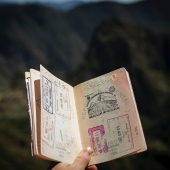It can be tough sending your child abroad. Though it may not seem like it, they’re pretty cut up about it too. In fact, most students will base their university choice partly on the distance from their family home (perhaps subconsciously), so great is the feeling of loss when moving away.
But it is important to remember how valuable it is moving further abroad, in part because of the independence and bravery it instils. Sometimes it does just take letting go. But there’s no reason you can’t still reach out to call, offer help and generally pester and annoy (they will appreciate it, again whether they realise it or not).
Here is a step-by-step guide on sending your child abroad to study:
Where?
Choosing where to study abroad can be tricky because there are so many rich, exciting destinations to choose from. Distance from the family home, as alluded to before, is an important one. Yet it is also good to remember that with the internet, cheaper flights and long student breaks, the world is smaller than it appears. Do try and keep the following questions in mind:
- Is it better to study in a single area, or several? A large city, or a more rural area?
- Foreign education often allows the option of starting at different times of the year. Which time will be best suited? For how long?
- Are there restrictions from any current school for when to go abroad and for how long?
- Is the program affordable? Will this program offer or accept any financial aid?
- Will insurance need to be purchased?
- Are there any foreign language considerations to be concerned about?
- Is it better to live on campus in a dorm with other students, with a local family or alone?
- Is it possible to adjust to a country with very different cultural and culinary customs?
How?
Once you’ve decided on where is best, there’s the small matter of getting there. Visiting one of our local Global Education Fairs can be your first point of call, whereupon you will receive first-class, personalised advice on how best to organise travel, visas and accommodation.
In short, make sure all your child’s personal effects are in order and available for either yourself or him/her. These include amending bank details, moving costs, tickets for travel, arrival plans, new home location, and packing in advance. However, these all remain fairly straight-forward. To ensure your child’s safety, it’s most important that they remain insured and in contact.
How to Stay Connected
Of course these days, the internet is the simplest way to contact others cross-borders. Using messaging apps via Wi-Fi, in particular, are easy and reduce the risk of unexpected charges. WhatsApp, Skype or Facebook Messenger are some examples of commonly used internet messaging services. Each of these can all also be used to make calls as well as messages.
Sometimes though, you need immediate emergency contact. Hopefully not, but it is occasionally necessary. For the traveller, having an extra, international phone can often be a cheap way of staying in contact. After the initial cost of purchasing the phone, they can be a very economical way of staying in touch, particularly if the course will last longer than a year.
It is also worth checking your current carriers and comparing prices. International rates can be very expensive, but they can also be surprisingly cheap- networks frequently give international minutes away to encourage customers. It’s also possible to get an international SIM card from your current carrier. Double check the costs first!
Staying Safe
Parents will forever look to protect their children, of course, and that instinct is at its strongest when they go away to travel. Luckily, institutions and organizations involved with student travel will always seek to protect their health and safety.
The difficulty remains that the safety of your child will mostly rest on their own shoulders and oftentimes the best thing to do is give them the space to make mistakes. This is an educational experience after all. Though that doesn’t mean you should be off the grid. They will still need you from time to time. And before they go.
Before they do leave, make sure that he/she is in good health, which is to say they have received any shots or vaccines that are required as well as researched as much as possible about any potential health concerns. Many study programs will require medical forms about your child's physical and mental health. Make sure these are available if needed.
Also make sure any medicines or prescriptions are filled or are available at the destination. Also make sure to note any differing names of said medicine, or indeed what it translates to.
Students may be asked to show proof of insurance or to purchase a special policy. You should purchase insurance not just for an emergency scenario but also for peace of mind. Make sure this is bought in advance of leaving and that any documentation is taken with them on the flight.
Depending on the destination, there may be particular insurance schemes or safety precautions. For Europeans travelling in Europe, for example, there exists a European Health Insurance Card (EHIC) that allows access to state-provided healthcare. Make sure to research any potential schemes like this to make sure you’re well covered.
It may also be worthwhile insuring your child’s belongings. It is easy to lose things when travelling and you don’t want to lose or break a laptop or valuable phone when abroad without being covered, especially when these things put so many minds at ease.










